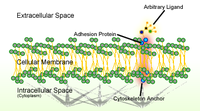
Photo from wikipedia
Analysis of T lymphocyte proliferation and activation after antigenic or mitogenic stimulation is a vital parameter used in the diagnosis of various immuno-deficiencies and during the monitoring of treatment responses.… Click to show full abstract
Analysis of T lymphocyte proliferation and activation after antigenic or mitogenic stimulation is a vital parameter used in the diagnosis of various immuno-deficiencies and during the monitoring of treatment responses. Most applied techniques are based on the incorporation of tritiated thymidine (3H-TdR) or ELISPOT analysis, both rely on rather time-consuming/-intensive ex vivo protocols or encompass inherent drawbacks such as the inability to distinguish specific cell populations (3H-TdR, ELISPOT) or focus on a single cytokine (ELISPOT). Here we aimed at characterizing the rapid expression of intracellular CD154 (CD40L) as a marker for rare antigen-specific CD4+ T cells in pemphigus vulgaris (PV). Upon stimulation with human desmoglein (Dsg) 3, the major autoantigen in PV, the expression of CD154 was significantly increased in PV patients compared to healthy controls (HC) and correlated with anti-Dsg3 IgG titers. Patients with active disease showed higher numbers of Dsg3-reactive CD4+ T cells in CXCR5+ T follicular helper cells. In remittent PV and HC, CXCR5+CD4+ T cells remained largely unaffected by Dsg3. IL-17 and IL-21 expression were significantly induced only in CD154+CD4+ T cells from PV patients, lending themselves as potential novel treatment targets. Additionally, stimulation with immunodominant Dsg3-derived epitopes strongly induced a CD4+ T cell response via CD40-CD154 interaction similar to the human Dsg3 protein. We here established a rapid ex vivo assay allowing the detection of Dsg3-reactive CD4+ T cells from activated systemically available PBMCs, which further supports the crucial concept of antigen-specific T cells in the pathogenesis of PV.
Journal Title: Frontiers in Immunology
Year Published: 2022
Link to full text (if available)
Share on Social Media: Sign Up to like & get
recommendations!